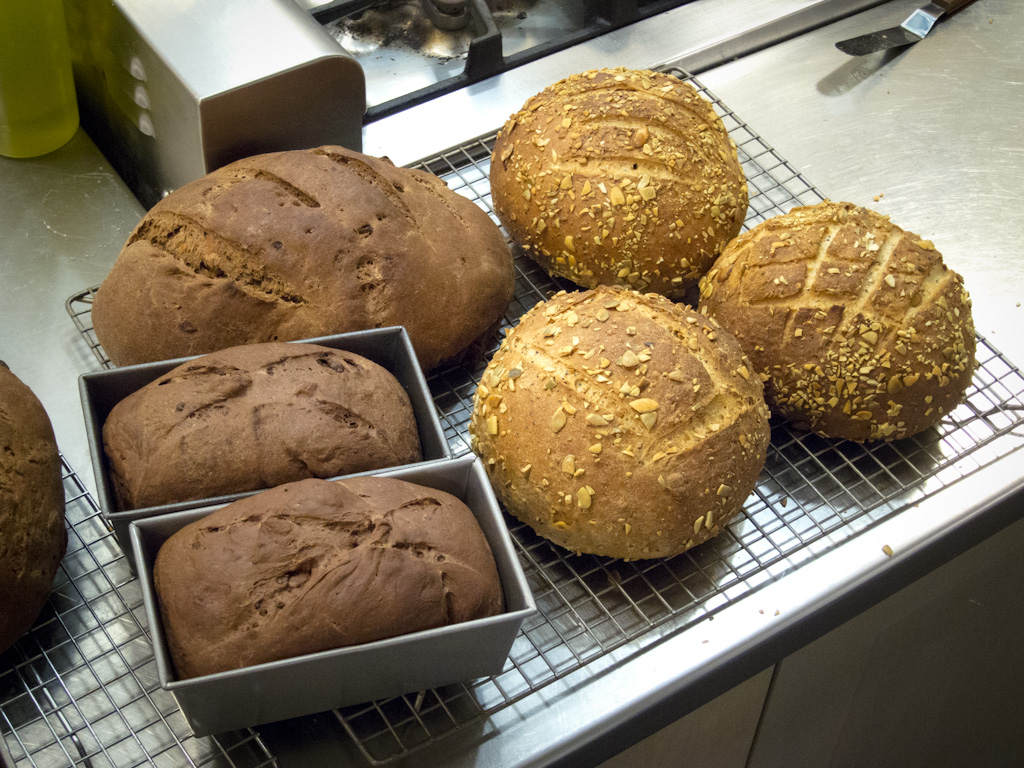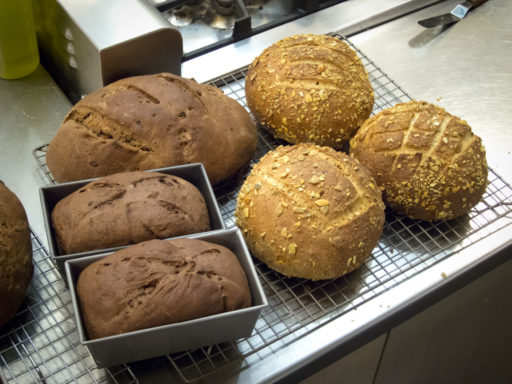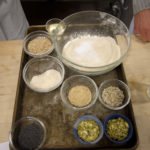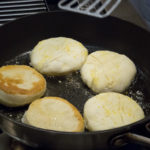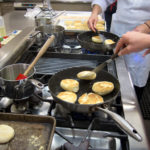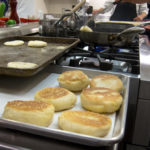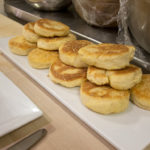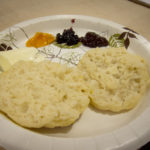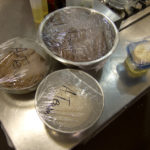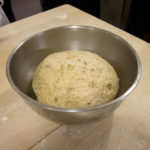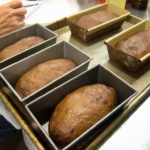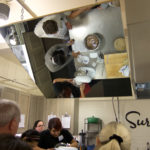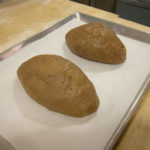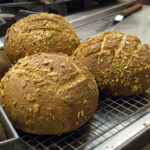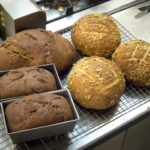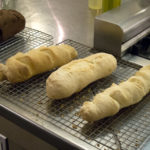Loaves 3 thru 7 – Sur La Table Bread Class
One of the reasons I decided to do this project is that Sarah gave me bread classes for Christmas. I attended the “2-Day Artisan Bread Workshop” with Chef Deanna Gin last weekend at Sur La Table in Palo Alto. The class was three hours each day. The first day we made English Muffins and prepared four other breads for baking on the second day.
Lessons
- Use a scale for dry measurements rather than a measuring cup. The difference can be huge.
- “Pull a window” to see if the dough has been kneaded enough. This is done by stretching a piece of dough. If it forms a thin membrane you can almost see through it’s ready, if it breaks it’s not.
- Using a mixer is way less work than kneading by hand. (I knew this, but we proved it.)
- Test if the bread is done with a thermometer – internal temperature varies by bread, but is typically about 195-200°.
- There are four stages that dough goes through when you are mixing it:
- Pick up stage – the ingredients are mixing (all the parts are getting picked up)
- Initial development – the dough starts to become smooth
- Clean up stage – the dough is coming together and starts to come off the side of the bowl (thus ‘clean up’)
- Final development – the bowl is clean and the mass clings to the dough hook
- Clarified butter has a higher burning temperature (450° vs. 350°), and be kept on a shelf like other oils for a long time.
- Lots of different techniques to shape loaves and rolls.
- How to score bread before baking.
Breads
We made five different breads, plus a bonus sixth on Sunday.
- English Muffins (#3) – Made the first day. This takes about three hours start to finish, though the dough could be kept overnight in the fridge. After the dough has risen a couple times you cut it in circles, fry them in clarified butter and the finish in the oven. Very good flavor, but I must admit I like Thomas’ just as much.
- Seeded Whole Wheat Boule (#4) – These were delicious and surprisingly sweet. The recipe called for using a food processor, which Deanna is solidly against for bread. We hand kneaded it instead to experience that effort. I’m going to make this bread with a mixer soon. Shaping it into a smooth ball turned out to be very easy.
- Apricot Rye Bread (#5) – I didn’t like this one. I’m not a big fan of rye bread generally (except as a sandwich bread) and the addition of cocoa powder wasn’t a great match for my taste. More apricot would have been nice, though. I won’t be making this bread again.
- Double Dark Chocolate Bread (#6) – This was interesting. It has lots of cocoa powder, a shot of espresso powder and lots of chopped bittersweet chocolate in it. If it didn’t have yeast I think it would just be a chocolate cake – it sure tasted like one. They suggest it as a breakfast or dessert food. I probably won’t make this one again, either.
- Wheat Stalk Baguette (#7) – The flavor of these was wonderful, they had a very crisp crust (due to misting during baking) and a soft inside. They didn’t brown up very well, I’ll see what happens when I make them at home. We had a lesson on ways to shape the baguettes (including snipping them with scissors to get kernels like a wheat shaft), and you can see in the pictures that our results were pretty amateurish.
- Bonus: Cloverleaf Dinner Rolls – These were made on Sunday using a potato to create starchy water. They added crushed garlic and rosemary to the dough during the final mixing, and brushed the tops of the rolls with garlic infused olive oil and Parmesan cheese before baking. We learned different ways to roll and knot the dough to make interesting rolls. I’m not counting this one as one of my loaves because I didn’t participate in making them.
- Seeded Whole Wheat Bread ingredients.
- Frying English Muffins.
- Frying English Muffins.
- English Muffins before, during and after frying.
- Finished English Muffins.
- Breads ready to spend the night in the fridge.
- Seeded Whole Wheat Boule rising.
- Small loaves of Double Dark Chocolate bread.
- In the classroom kitchen.
- Apricot Rye Batards.
- Seeded Whole Wheat Boules.
- Apricot Rye, Double Dark Chocolate, and Seeded Whole Wheat Boule.
- Baguettes, with amateur shaping.

